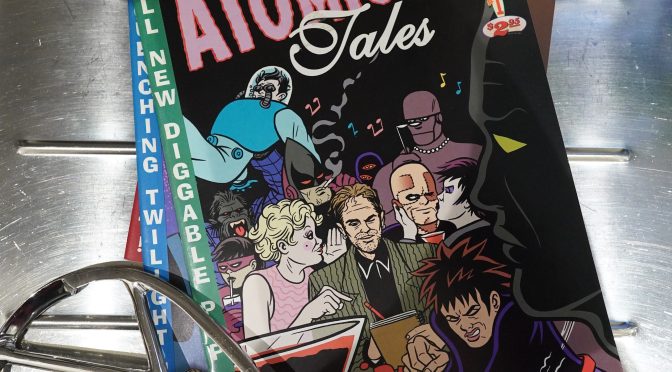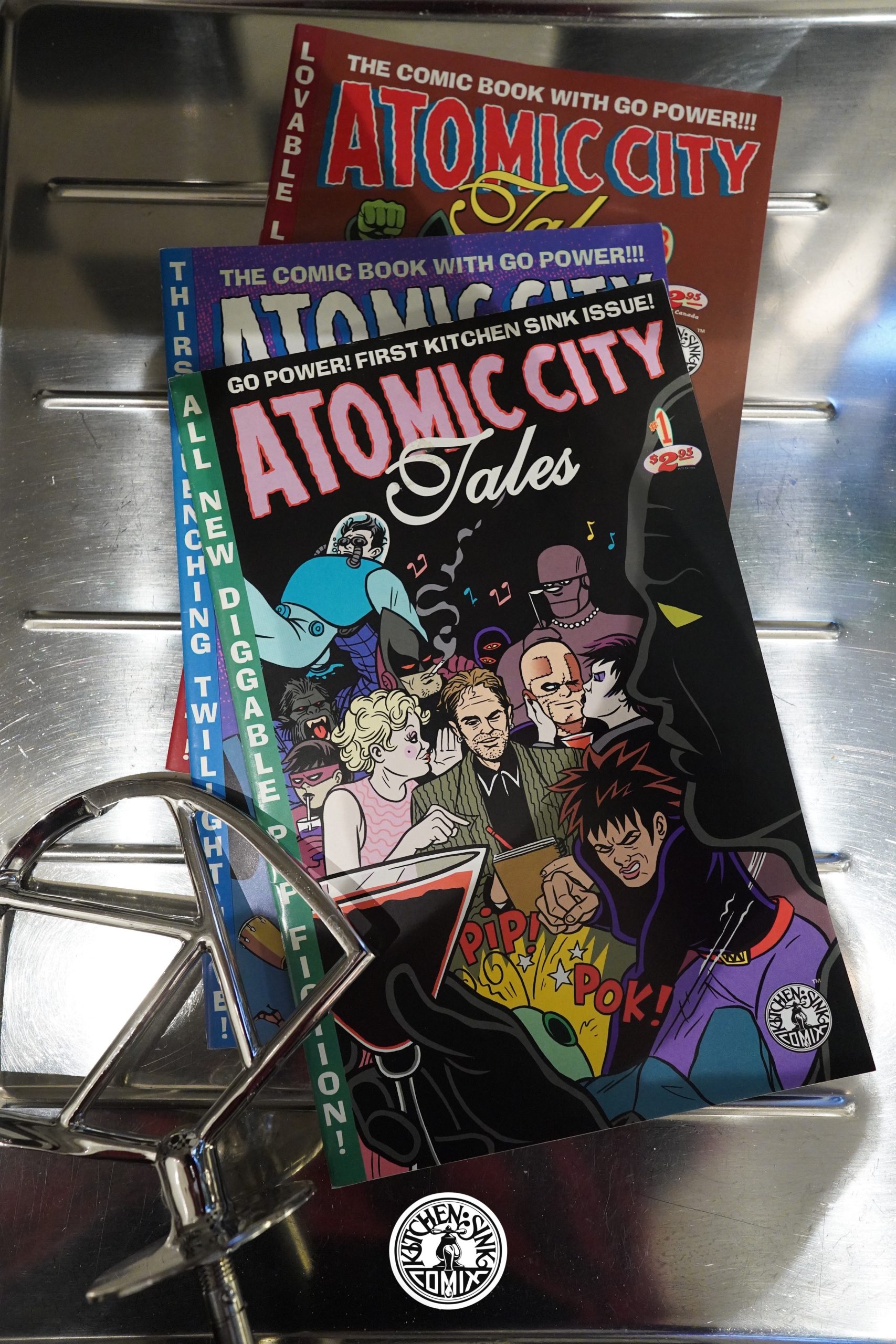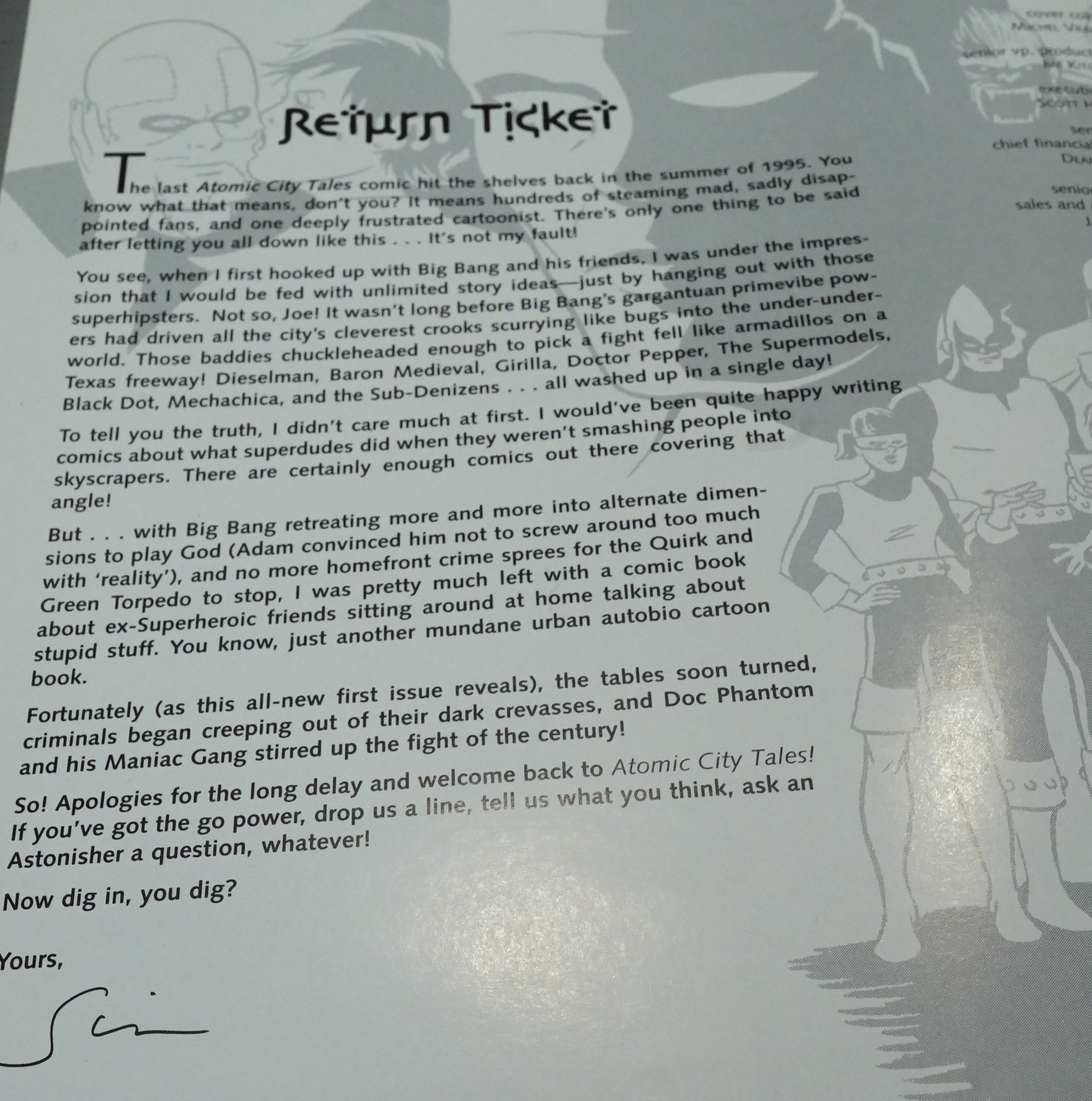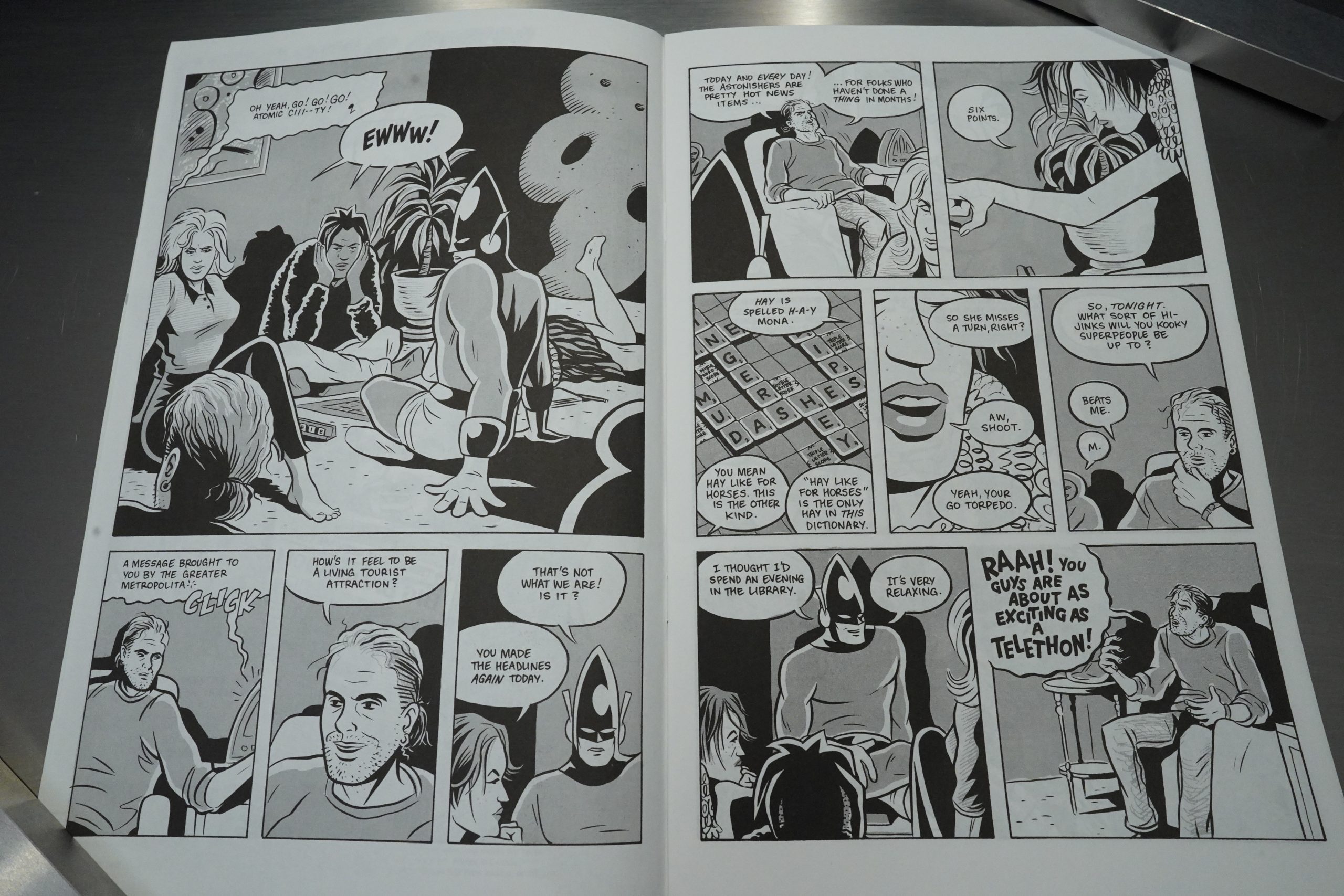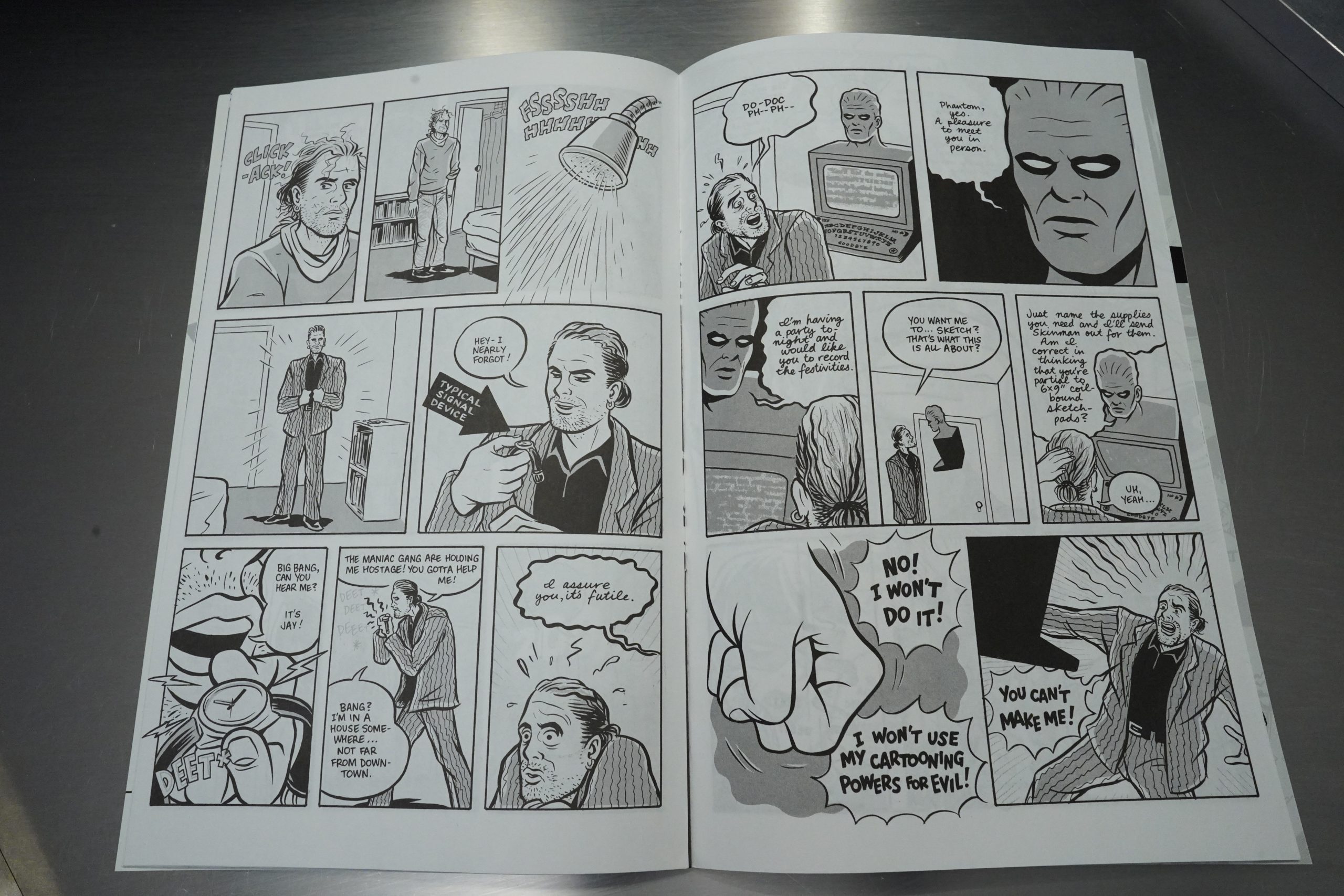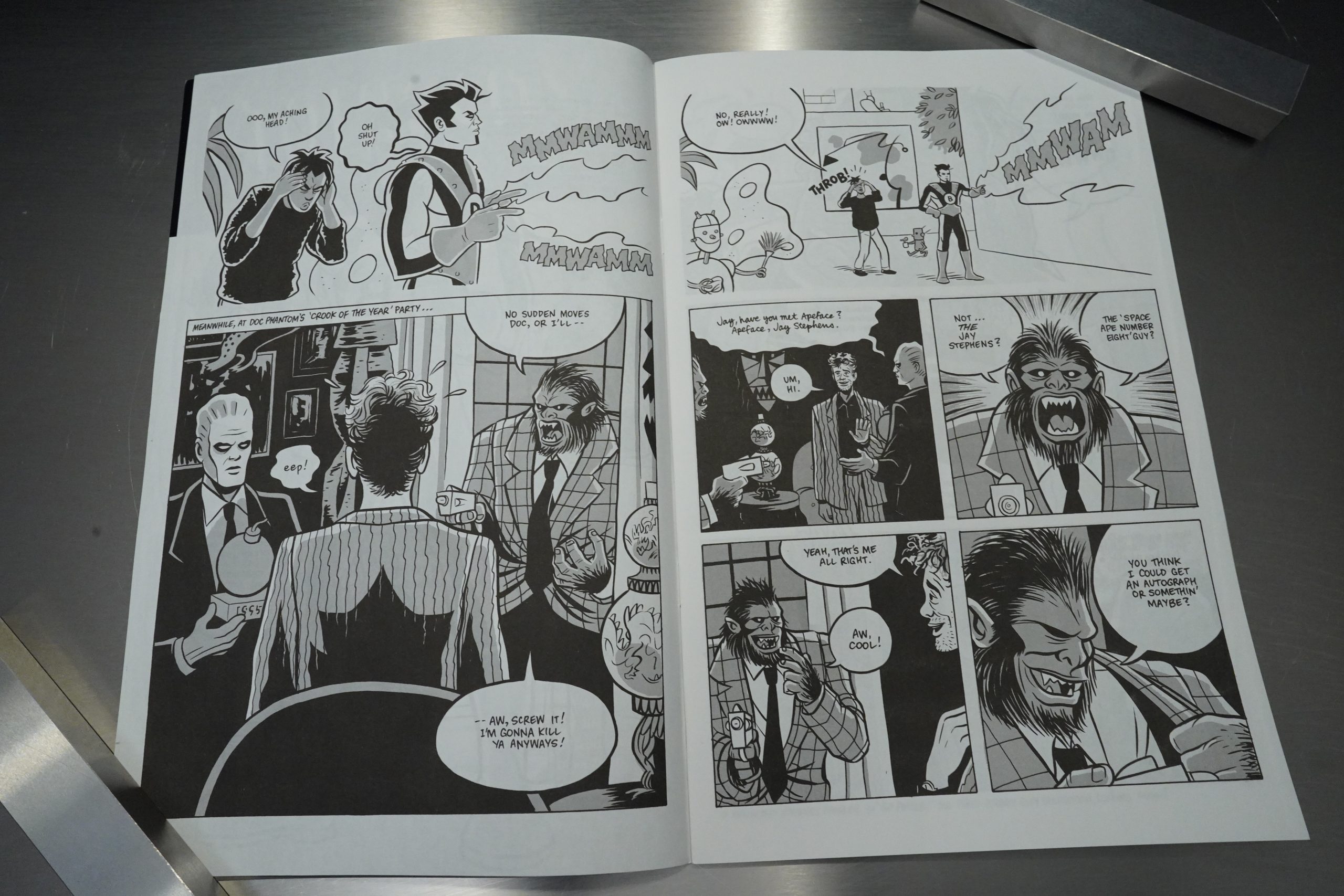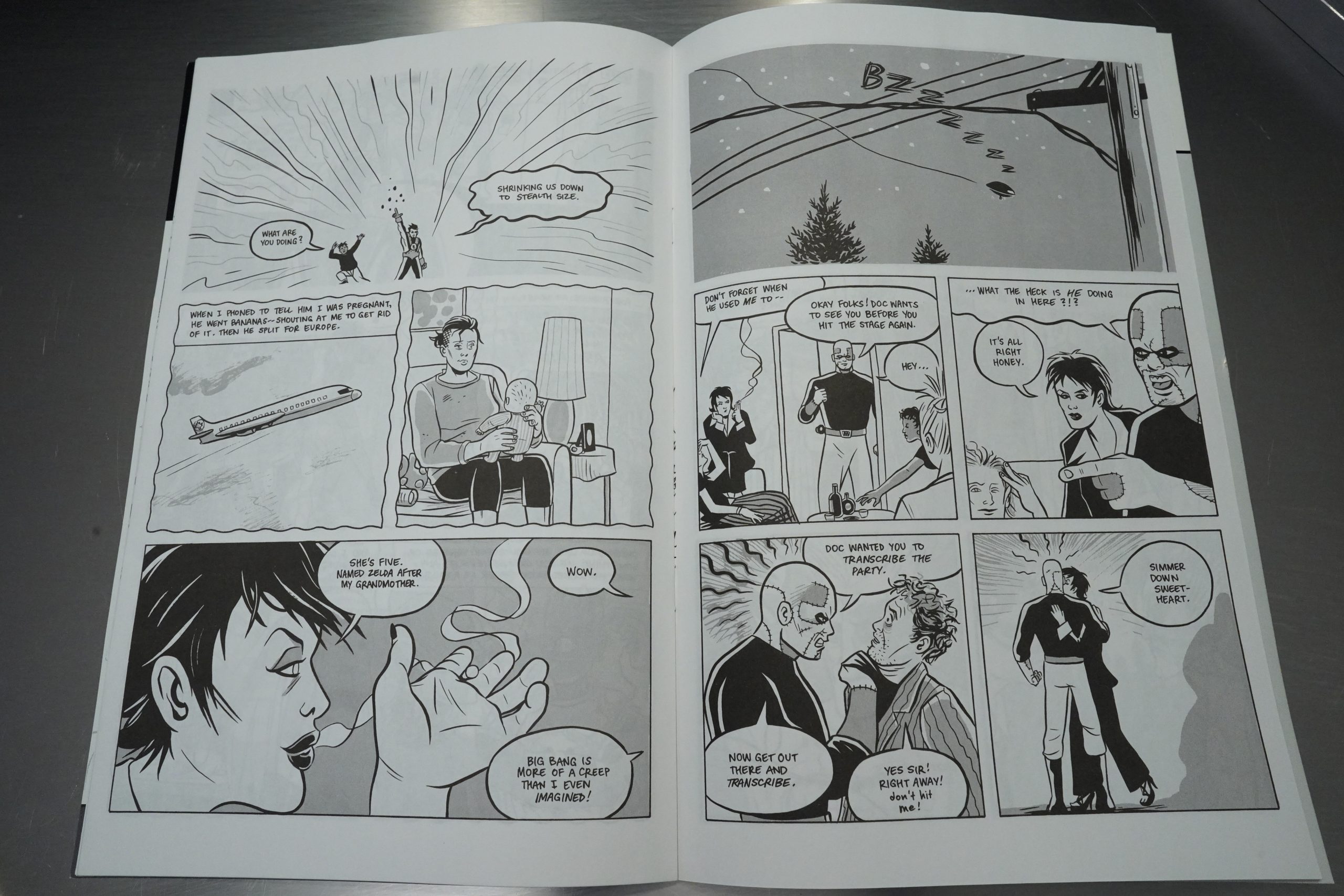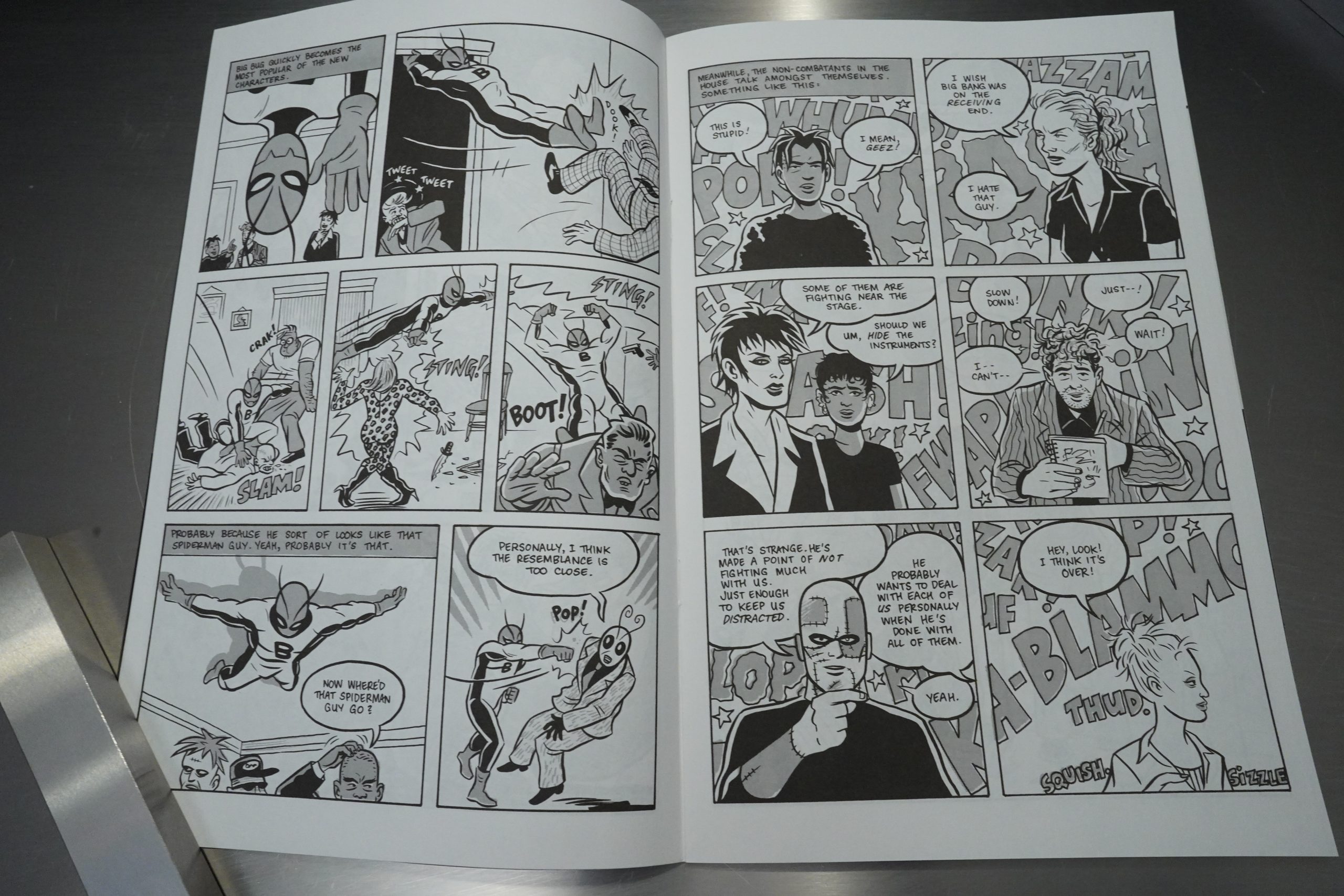Atomic City Tales (1996) #1-3 by Jay Stephens
When I went to pick these comics up from the shortbox, I was wondering “but why did Mike Allred return to Kitchen Sink at this point?” before opening the first issue and going “doh! It’s Jay Stephens!”
Which is unfair to Stephens, because their art styles aren’t all that similar, really. But they do have a similar design vibe going on — retro-futuristic, with clean, attractive lines.
The first issues of Atomic City Tales were published by Black Eye some years earlier. (Hm… I should do a blog series about Black Eye — everything they published was good. It’d be a short series, though.)
The conceit here is that Stephens lives with these super-heroes and the book we’re reading is an autobio book. I guess Bernie Mireault was working in a similar area with his The Jam book, although that was less meta.
Reader, he made him.
The second issue tells two stories at once, with one (mostly) occupying the top row. It’s fun, but it doesn’t really come together all that well: It feels like the top strip is mostly treading water until the two storylines can be brought together.
But it’s an appealing, breezy read. It’s not actually “ha ha” funny, but it’s amusing.
Like this epic fight scene.
This isn’t announced as a limited series, but the storyline wraps up in the third issue, so perhaps the writing was on the wall.
Stephens in interviewed in The Comics Journal #212, page 92:
ATOMIC CITY FAILS
SULLIVAN: Let’s talk a little bit about Atomic
City Tales.
STEMNS: I know you don’t like it. [laughs]
SULLIVAN: I like it.
STE*ENS: I like to tease you al»ut that review,
SULLIVAN: It was a positive review.
STEMNS: I know. It was just a very qualified
review. good, but — [laughs] I We seen
SIRLIVAN: Nou I understand that you had all
these outlets for the funny characters that I love,
even though couldn see any Of them.
STEPHENS: If I could do everything at once, I
SIRLIVAN: Butyour letters pages in Atomic City
Tales •were hysterical. You wouldthink in a super-
hero—dominated industry, everybody would go
“wow, Jay’s doing funny superheroes. Yet you
seemed to get all the nutcases writing in saying,
This is 0K, but cvby don’t you do some more
You be very patient, gritted teeth, *Just
let it go for a little bit, you’ll see I’m doing good stuff
anyway.
STEPHENS: I got almost nothing but negative mail.
Very few encouraging letters. What can I tell you? I
guess it was a failed project.
SULLIVAN: And yet it continued over two publishers.
STERENS: The Atomic City story is a sad one.
SULLIVAN: Tell it.
STERENS: les a long, drawn-out story. les almost a
tragedy from the beginning.
SULLIVAN: Why?
STE*ENS: I begged Michel to do it, then I had to insist
he pay me, which was a new thing at the time, and then
it didn’t really sell. Let it be known, though, that
publishing-wise, everything Ive done has been at the
worst possible time. I mean, Tragedy Strikes entered
publishing right at the beginning of the glut, and by
the time I was doing Atomic City Tales there were
thousands of new crappy superhero comics out there.
The competition on the rack was unbelievable. m not
making excuses, m just saying it had something to do
with it.
so it was a really hard go, and I think Michel
became embarrassed that he “‘as doing Atomic City
Tales. He was focusing on more and more so-called
highbrow material, and was very proud of it. Even
though my stuff was selling better than that stuff, I
think he was kind of nervous that he was doing this
book that was more rooted in pop. We were both
happy when I decided to shop it around elsewhere. So
we left on amicable terms, and I began negotiations
with Matt Groening’s Bongo Comics. Actually, Zongo
Comics was supposed to do it, because rd met Matt at
San Diego in ’94, and gave him copies. He very
interested in picking it up, and promptly passed it over
to the people at Zongo, who rm sure he believes are
very capable [laughs] individuals. Maybe theyre more
capable now, but it was a nerve-wracking experience.
They wanted more than they should have been asking
were a new company. It was a terrible
contract.
SULLIVAN: Were they frying toget control wer the tharac-
ters?
STERENS: Theywanted all control. They wanted to be
able to make movies and cartoons and not pay me
anything for it. Embarrassing, ridiculous control. And
what was worse was that the negotiations dragged on
for almost a year.
The contract came in two parts. The first part was
the publishing agreement, which mentioned that there
was a media agreement shortly to follow. We spent
months hammering out the publishing thing. They
had no provisions for return of artwork, for crying out
loud. We finally worked that out, and then got the
media one and were just blown away. I had to get an
agent, because I was dealing with these people. This is
when I first met Jean-Marc L’Officier at Starwatcher,
who is a saint, and has become oneof my closest friends
in the comics business. Anyway, he got the contract in
San Diego the year I didn’t go, which was ’95. Right
there at the convention, he called me and said, “Listen,
this is terrible, and I have to ad-
vise you not to sign it, even though
we’ve spent time and money try-
ing to do this.” So I didn’t have
anything come Out in those ten
months. It was a terrible, terrible
time for me — at the same time,
my marnage was over.
We pulled the contract from
them, went straight to Kitchen
Sink and signed it. It took me
awhile to realize that by the time
I’d signed that contract, my inter-
est in Atomic City Tales had been
sincerely dampened by the whole
experience. It was hard for me to
get motivated about doing it for
Kitchen Sink. I’m proud of the
issues I did at Kitchen Sink, but it
was a very different project by
that time.
SLRLIVAN: In the first issue oftbe
Kitchen Sink one, in your editorial,
you said something
stoned doing it before betawe I ran
out of ideas. That’s not exactly cheerleading your neu
audience. You’re like, “It’s hard to do andl ran out ofideas,
and let’s try it again.
STEPHENS: All that negative fan mail started to get to
me. I started to believe them.
S UL LIVAN: also told me thatyou got bored With it.
STEPHENS: Well, I did, eventually. There was a lot of
stuff that is interesting about that project — but the
one thing I didn’t have was a clear focus. By the time
I’d realized what kind ofa focus the series could have,
the previous books had already muddied the water, so
to speak Also, ifyou’re going to do an ongoing series,
and ifyou’re going to have the issues come out three or
four months apart, it’s better to do self-contained
stories. This is stuff that took me years to learn.
[laughs] Stuff that seems obvious now. If you want to
do cliffhanger serials, you really need to put the book
out monthly.
St.RLlVAN: I loved thefght over a park—
ing space in It seemed like the best
crystallization ofuhatyou could do With
the book, in terms ofthe mundane andthe
superheroic coming together.
STEPHENS: There’s a staring fight in
one of the Kitchen Sink issues, too.
There would be moments like that,
and yet other parts didn’t cohere quite
as well. I had too many different voices
going in there — too many different
influences were drawn in.[…]
SLLLIVAN: Now, you had a collection of this, called Go
Power. That really sneaked out.
STEPHENS: It didn’t sneak out, it’s the last thing that
came out before Kitchen Sink went temporarily bank-
rupt. Again, my timing could not have been worse.
The collection had been printed, and Kitchen Sink
didn’t really exist any more. There was no system to get
itoutthere. I think the initial orders wentthrough, and
then that was it. les been remaindered at Diamond,
so. another disaster.
SULLIVAN: Did you end up with Kitchen Sink owingyou
money ?
—alik
STERENS: Oh no, they were great! I loved working
with Kitchen Sink. Denis is great. I wish I’d done
better by them. I wish I could have put it out faster, and
I wish I’d had that clear vision I was just talking about.
[laughs] It was just bad timing. They were in the
middle Of that mess with the second Crow film. They
were kind enough to apprise meofthe coming troubles,
but I truly did think they were out of business for
awhile, which was when I moved to Europe, and I
didn’t know they were back till much later. But when
I did find out they were in business and I gave them a
call, they promptly paid me. I had no problem. Of
course, when the Journal did the report on that, they
didn’t bother to call me. [laughs] They never call me
for news, because I only have good news. What
would that be?
Darcy Sullivan writes in The Comics Journal #179, page 45:
AT THE RIPE OLD AGE of 24, Jay
Stephens is already getting hassled by people
who say his older comics were better.
Considering thatStephens only stopped doing
his “older” comics last year, this seems a bit
perverse. Until you read The I-and of Nod
Treasury.[…]
Unfortunately, Stephens isn’ t doing Sin any-
more. Last year, he switched to a book called
Atomic City Tales, a superhero spoof that suffers
from similarities to too many projects, includ-
ing Michael Allred’ s current Madman Comics.
Longer narrati ves, full characterization and more
“realistic”-lookingcharacters don’t provide the
same manic charge that zaps you on every page
or so of Innd of Nod.
Even those devices that served Stephens
well before falter inACT. When the artist moped
around Sin in his Badman costume, it was
enjoyably ridiculous. In ACT, Stephens’ fre-
quent appearances are distracting — it’s not
clear what he’s doing there, and his character
seems annoyingly bland. Chief ACT villains
The Maniac Gang have some of The Sinister
Horde’ s amusingpettiness, but Stephens seems
less happy-go-lucky now. For sheer fun, noth-
ing so far in the new series has matched the
scene in Land of Nod when Dave, who re-
sembles a sort of deconstructed Donald Duck,
has a panic attack over the “serious” direction
of his favorite comic, The Sinister Horde. His
buddy Merv (a melted Mickey Mouse) takes
one look and flings the comic away, exclaiming
“Poo! Whata reek!” (Merv should write for the
Journal.)
The controversy rages in the ACT letters
pages about whether Stephens has taken the
wrong direction himself; he admits that older
readers tend to prefer Sin. Perhaps they (like
this reviewer) have already seen the vperhero
genre lampooned too many times. Stephens
himself seems baffled by some readers’ unwill-
ingness to have fun with superheroes, and is
sticking to his guns. Certainly, given his track
record, Atomic City Tales is worth watching;
once Stephens finds his feet with the book, it
may embrace the unexpected the way Madman
Comics decidedly has not. (When Nod had a
cameo inACT#3 , you could practically hear the
geezers cheering.)
This is the one hundred and ninety-ninth post in the Entire Kitchen Sink blog series.
